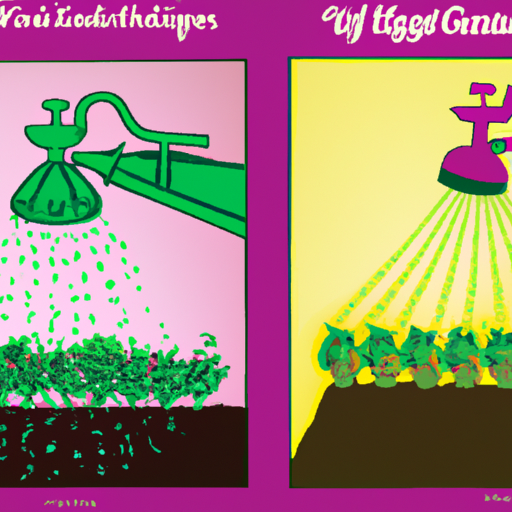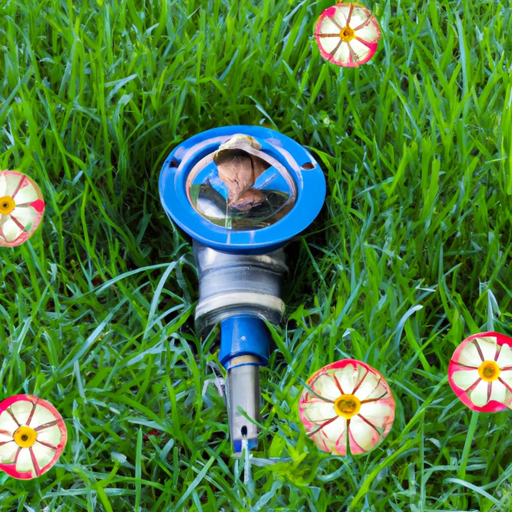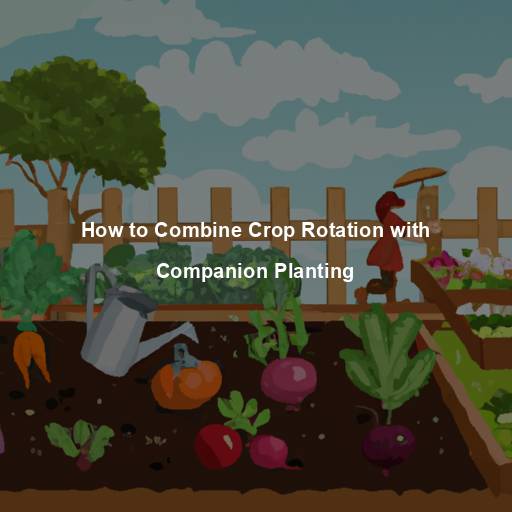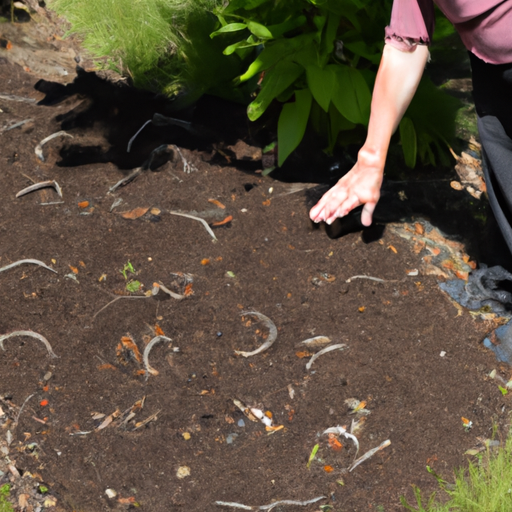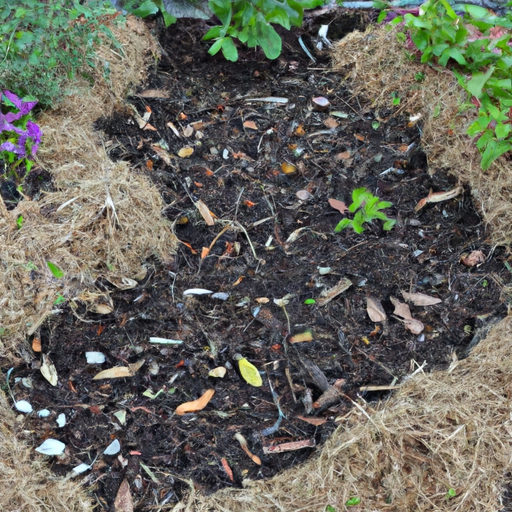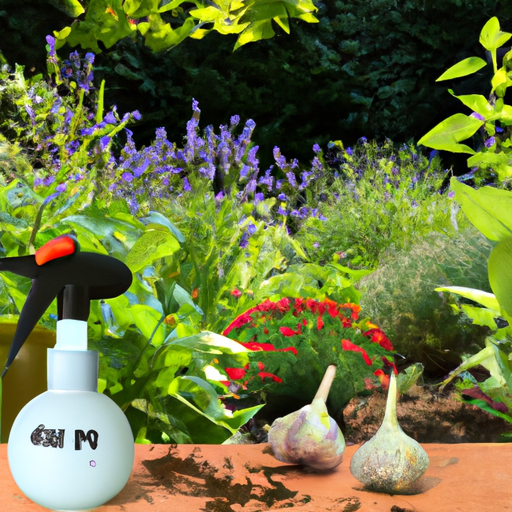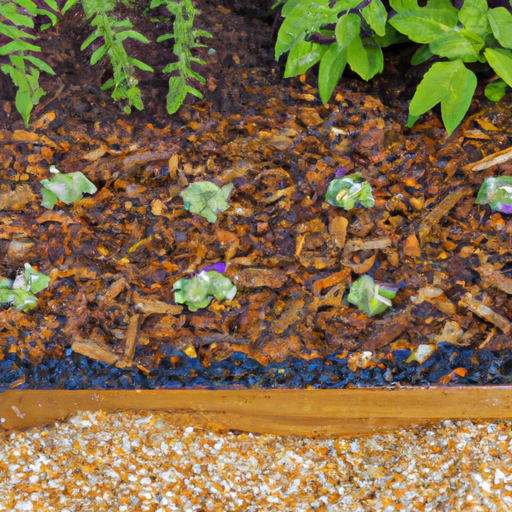Are you looking for the most efficient irrigation method for your organic garden? You may be wondering whether to use drip or spray irrigation.
Both have their pros and cons, but ultimately, it comes down to what’s best suited for your specific needs.
Drip irrigation is a popular choice among many organic gardeners due to its water conservation benefits. This method involves slowly releasing water directly into the soil at the base of plants through small holes in tubing.
On the other hand, spray irrigation uses overhead sprinklers that distribute water over a larger area. While this method can cover more ground quickly, it also has a higher potential for evaporation and wasted water.
Let’s take a closer look at both methods to determine which one might work best for your organic garden.
Drip Irrigation: Pros And Cons
Drip irrigation is a cost-effective and efficient way to water your organic garden. This type of irrigation system delivers water directly to the roots of plants through a series of tubes, which minimizes evaporation and runoff.
One major advantage of drip irrigation is that it can save you money on your water bill, as it uses less water than traditional spray systems. Additionally, drip irrigation requires minimal maintenance once installed, making it an ideal choice for busy gardeners who want to spend more time enjoying their harvests rather than tending to their watering systems.
However, it’s important to note that installation costs may be higher initially due to the need for specialized equipment and careful design planning.
Overall, if you’re looking for a low-maintenance and cost-effective way to keep your organic garden hydrated, drip irrigation may be the perfect solution for you.
Spray Irrigation: Pros And Cons
As we explored the benefits and drawbacks of drip irrigation in the previous section, let’s now delve into spray irrigation. Imagine a hot summer day where you’re feeling parched and desperately need a refreshing drink. You have two options: sipping water drop by drop or being drenched with cool water from above. Similarly, spray irrigation uses sprinklers that shower plants with water droplets, unlike drip irrigation that releases water slowly near plant roots. While it may seem like an easy choice to make, there are pros and cons to each method.
When it comes to maintenance tips for spray irrigation systems, regular checks for leaks, clogs, and broken parts are crucial. The system should also be adjusted seasonally based on your garden’s needs as well as weather patterns such as wind speed and humidity levels. Environmental impact is another factor to consider since spray irrigation can lead to more evaporation than drip systems due to exposure to air and sunlight.
To gain deeper insights into this topic, here are three sub-lists that will help you make an informed decision:
– Advantages of Spray Irrigation:
– Ideal for larger gardens
– Covers a wider area efficiently
– Provides better leaf coverage leading to healthier foliage
– Disadvantages of Spray Irrigation:
– Higher water usage due to evaporation
– Can result in fungal growth if leaves aren’t dried properly
– Not suitable for windy areas as misting can occur
– Environmental Impact:
– Increased energy consumption due to pumping water through pipes under high pressure
– Water wastage leads to depletion of natural resources
– Runoff from fertilizers can contaminate nearby lakes or rivers causing harm to aquatic life
As a Master Gardener, I encourage you to weigh these factors carefully before deciding which irrigation method would work best for your organic garden. Remember that every garden has unique needs depending on its size, soil type, and plant species. By being mindful of the pros and cons, maintenance tips, and environmental impact of spray irrigation systems, you can make an informed decision that works for both your garden and the planet.
Water Conservation Benefits Of Drip Irrigation
When it comes to water conservation, drip irrigation has a clear advantage over spray irrigation.
Drip systems deliver water directly to the roots of your plants, reducing evaporation and runoff.
This targeted approach can save up to 60% more water than traditional spray methods.
Plus, drip irrigation installation is relatively easy and straightforward with the right tools and materials.
However, proper maintenance is key to ensuring optimal performance from your system.
Regularly check for clogs or leaks in the lines and emitters, and adjust watering schedules based on weather conditions and plant needs.
By following these simple maintenance tips for drip irrigation, you’ll not only conserve water but also promote healthier growth in your organic garden without breaking the bank.
Efficiency And Coverage Of Spray Irrigation
Spray irrigation systems use a spray nozzle to distribute water over the garden area. This system is designed in such a way that it releases water under pressure, creating fine droplets that are spread evenly across the soil surface. As a result, this technique provides excellent coverage for larger areas of farmland or gardens.
However, these systems require adequate water pressure to function effectively and may not be suitable if the water supply is low. Additionally, spraying can sometimes cause plant diseases when leaves remain wet for prolonged periods. Overall, spray irrigation tends to be more efficient than drip irrigation for large-scale farming operations but requires regular maintenance to ensure proper functionality.
Therefore, Master Gardeners often recommend spray irrigation as an ideal option for organic gardening projects with sufficient access to ample water resources and proper care protocols.
Choosing The Best Irrigation Method For Your Organic Garden
Now that we have discussed the efficiency and coverage of spray irrigation, it’s time to move on to choosing the best irrigation method for your organic garden.
First and foremost, consider rainwater collection as a sustainable option for watering your plants. It not only saves water but also benefits soil quality by providing natural nutrients.
Another important factor is soil quality assessment before deciding on an irrigation method. Understanding the type of soil in your garden will help determine how much water is needed and which method can provide proper penetration without causing runoff or waterlogging.
So, whether you choose drip or spray irrigation, make sure to evaluate these factors beforehand to ensure optimal plant growth and yield.
Frequently Asked Questions
Can Drip Irrigation Be Used For Large-Scale Farming Or Is It Only Suitable For Small Gardens?
When it comes to large scale farming, the question of whether drip irrigation can be used arises. The technique of imagery is important here because we want our audience to understand the vastness and complexity of a large scale farm. Imagine hectares upon hectares of land that require watering on a daily basis. Drip irrigation may seem like an attractive option due to its efficiency in water usage but it also requires meticulous planning and implementation for such a massive area. It’s not impossible to use drip irrigation for large farms but it might take some time and effort to set up properly.
On the other hand, spray irrigation is highly efficient when it comes to small gardens or even backyard vegetable patches. This method sprays water over plants using sprinklers which ensures uniformity in distribution while also being cost-effective. For smaller areas, this type of system works perfectly well without much maintenance required.
As a Master Gardener, my advice would depend on what kind of garden you have and how much space you need to cover with your irrigation system. Both methods have their advantages depending on the situation at hand, so choose wisely!
How Often Do Spray Irrigation Systems Need To Be Monitored And Adjusted For Optimal Efficiency?
When it comes to spray irrigation systems, the importance of soil moisture cannot be overstated. You need to make sure that your plants are getting enough water without over-watering them and potentially causing root rot or other issues.
Monitoring and adjusting your system regularly is key to maintaining optimal efficiency, especially when weather conditions change. If it’s been raining frequently, for example, you might not need to run your system as often as you normally would. On the other hand, if there hasn’t been much rain lately, you may need to increase watering frequency to ensure that your plants stay healthy and hydrated.
Overall, keeping an eye on soil moisture levels and adapting your irrigation schedule accordingly can help you get the most out of your spray irrigation system in any weather conditions.
Is There A Significant Cost Difference Between Drip And Spray Irrigation Systems?
When it comes to irrigation systems for your organic garden, the cost comparison between drip and spray options can be significant.
While both methods have their benefits and drawbacks, the financial investment required for each differs greatly.
However, we must consider more than just the upfront cost – there is also the environmental impact to keep in mind.
As a Master Gardener, I urge you to weigh these factors carefully before making a decision.
Only then can you select an irrigation system that suits your needs while minimizing any negative effects on our planet’s delicate ecosystem.
Can Drip Irrigation Lead To Overwatering In Certain Plants Or Soil Types?
Drip irrigation is often touted as the most efficient way to water plants, but it’s important to note that there are alternatives.
While drip systems can be great for conserving water and delivering precise amounts of moisture to plant roots, they may not always be the best choice for certain soil types or plants with shallow root systems.
In these cases, other options like surface irrigation or sprinklers might be a better fit.
Additionally, proper soil moisture management is key when using any type of watering system – regardless of whether it uses drippers or sprayers.
Be sure to monitor soil conditions regularly and adjust your watering schedule accordingly to avoid overwatering or underwatering your plants.
Are There Any Specific Types Of Plants That Are Better Suited For Spray Irrigation Over Drip Irrigation, Or Vice Versa?
When it comes to irrigation effectiveness, choosing the right method for your plants is key. While both drip and spray irrigation have their benefits, certain plant types may be better suited for one over the other.
For example, shallow-rooted vegetables like lettuce or spinach may benefit from spray irrigation as it can help keep the soil surface moist. On the other hand, deep-rooted crops such as tomatoes or peppers may thrive with drip irrigation as water will reach deeper into the soil where their roots are located.
Ultimately, selecting suitable plants for your chosen irrigation method will ensure optimal growth and yield in your organic garden.
Conclusion
In conclusion, choosing between drip irrigation and spray irrigation depends on the specific needs of your organic garden. While drip irrigation is a great option for small gardens, it can also be used for large-scale farming with proper planning and installation.
On the other hand, spray irrigation systems require regular monitoring to ensure optimal efficiency. While cost may be a consideration when choosing an irrigation system, it’s important to keep in mind that investing in efficient watering techniques will save you money in the long run by conserving water and reducing waste.
Additionally, while certain plants may benefit from one type of irrigation over another, it ultimately comes down to personal preference and what works best for your individual garden. As Master Gardeners, we understand that gardening is not just about growing plants – it’s about cultivating a deeper connection with nature and learning to work in harmony with our environment.
Choosing the right type of irrigation system is just one way we can do our part to conserve resources and create a more sustainable future. So whether you choose drip or spray irrigation for your organic garden, remember: every drop counts!
